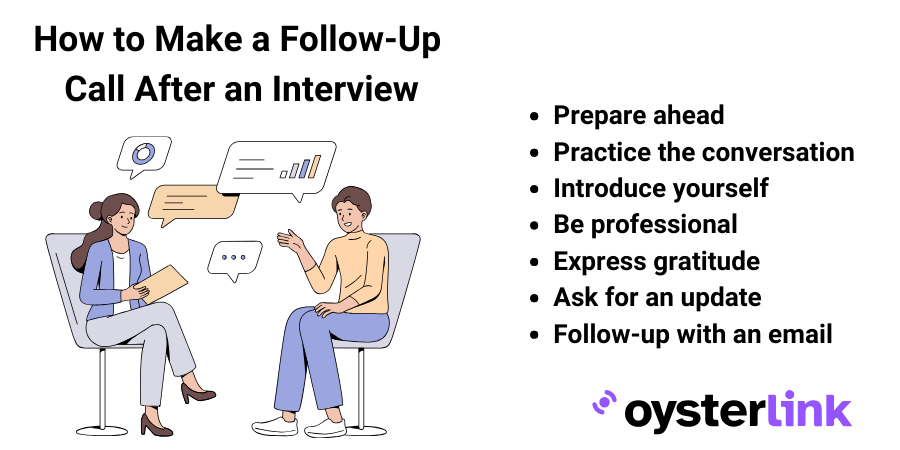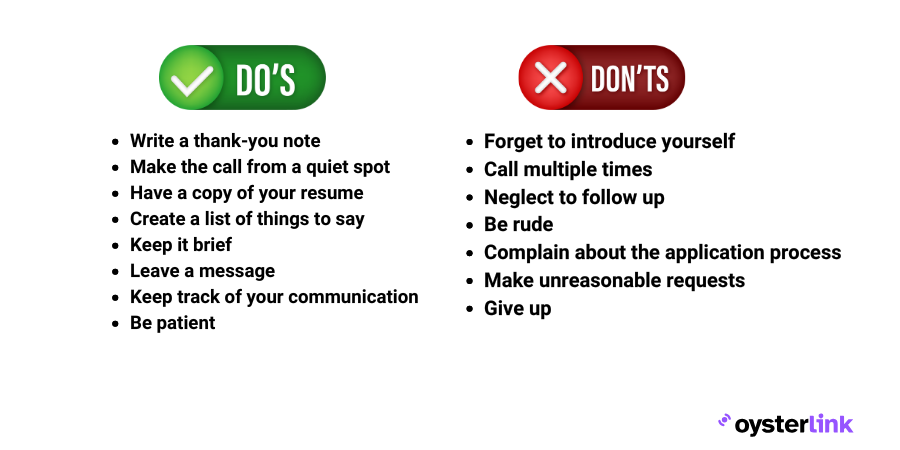Whether it’s perfecting your resume, practicing interview questions or waiting by the phone for a job offer, finding a job can be stressful.
To help relieve some of the stress post-interview, we’re here to assure you that there are steps you can take to keep your name top of mind as a candidate and increase your chances of getting the position—like making a follow-up call after an interview.
We’ll explain all you need to know about a post-interview follow-up call, from dos and don’ts to sample templates and our best tips to help ease the process.

Should You Make a Follow-Up Call After an Interview?
Yes. Making a follow-up call after an interview allows you to cover additional qualifications and strengths that you possess and reiterate your interest in the position.
Follow-up calls can even open opportunities to negotiate more favorable terms—such as a higher salary—if the recruiter is interested in moving forward with your candidacy.
When Should You Call After an Interview?
Typically, waiting one to two weeks after your interview is a good rule of thumb when asking the recruiter for an update via a follow-up call.
If you’re applying for a particularly competitive position, you may want to wait a little longer before following up.
Why shouldn’t you follow-up just days after your interview? Well, following up right after the interview can leave a bad impression and make the recruiter feel pressured, when they’re in the midst of the hiring process.
To set realistic expectations and prevent awkward exchanges, ask the recruiter when you can expect to hear back about their decision, during your interview.

How To Make a Follow-Up Call After an Interview
To make a follow-up call after an interview, follow these seven key steps:
1. Prepare Ahead
Before making the call, make sure you have all the necessary information—such as the recruiter’s contact details and the reason for your follow-up call.
The recruiter may ask you questions during the call, so be prepared to answer them. Review the job description and the questions you were asked during the interview to help you prepare.
2. Practice the Conversation
Next, practice the conversation by creating a short script for the call.
It’s normal to feel a little uneasy about making a follow-up call and creating a script will help prevent you from stuttering, stumbling over your words or leaving room for awkward silence.
In your script, include:
- Your full name
- The job title you interviewed for
- The date you were interviewed
- Questions you want to ask the recruiter—such as when you can expect to hear their decision, or details about the position that you forgot to cover during the interview
Once you have your script ready, it’s time to practice! Get rid of pre-speech jitters by rehearsing your script with a family member or friend.
3. Introduce Yourself
During your follow-up call, be sure to introduce yourself to remind the recruiter of your name and the position you applied for.
Remember, the interviewer has likely interviewed multiple people during the hiring process.
State the purpose of your call by saying, “I’m calling to follow up on the status of my application for the [position] at [company].”
4. Be Professional
Ensure that your tone of voice is friendly, polite and professional. Use proper phone etiquette and avoid using slang or casual language.
Remember, your communication skills may be a key factor in the decision of whether or not to make a job offer.
5. Express Your Gratitude
The hiring process can prove stressful for everyone who’s involved in the process.
In fact, recruiters must interview different applicants and deliver bad news to those who don’t make the cut.
At this stage, don’t forget to express your gratitude for the interview. This allows you to show that you’re grateful for the recruiter’s time and effort during the hiring process, while also reaffirming your interest in the position.
6. Ask for an Update
In addition to asking any questions you have post-interview, use the follow-up call to ask the recruiter when you might hear back about a final decision regarding the position.
7. Follow Up With an Email
After the phone call, follow up with an email to summarize the conversation and to thank the recruiter again for their time. This provides a written record of your conversation and keeps your contact details at the top of the recruiter’s inbox.
Dos & Don’ts After an Interview
From sending a thank you note to keeping the call brief, here are the dos and don’ts when making a follow-up call after an interview.
Dos
- Write a thank-you note: Send a thank-you email to the interviewer to express your appreciation for their time and to reiterate your interest in the position. Make sure to personalize the note and mention specific details from the interview, like what you feel you could bring to the table regarding the position. Send the thank you note one to two days after your interview.
- Make the call from a quiet spot: Whether it’s from the comfort of your bedroom or a tranquil coffee shop, a quiet corner will help you listen, think and speak clearly.
- Make sure you have a copy of your resume during your follow-up call to help you answer any questions the recruiter may have.
- Create a short list of what you’re going to say, including the key qualifications that make you the ideal match for the position.
- Keep the call brief: Don’t take up too much of the recruiter’s time.
- Leave a message if you get a voicemail: Put your script to the test by leaving a message on the recruiter’s voicemail. Keep your message short and to the point to help remind the recruiter about your job application.
- Be flexible: If the recruiter is unavailable to take your call, be flexible and try again at a different time. If you’re unable to reach the recruiter by phone, follow up with an email instead.
- Keep track of your communication: Keep track of your communication with the recruiter, including follow-up calls or emails. This will help you stay organized and ensure that you don’t accidentally send multiple messages about the same topic.
- Be patient: The hiring process can take time, especially if the recruiter is screening multiple candidates. If you haven’t heard back after a few weeks, consider sending one more follow-up message to ask about the status of your application.
- Prepare for the next step: If you are invited back for a job offer, research more about the company, review the job description and have a list of additional questions ready, so you can make an informed decision if approached with an offer.
Don’ts
- Don’t forget to introduce yourself on the call: According to public estimates, the typical recruiter will interview six to 10 candidates for a job. State your full name and the job you applied for to refresh the interviewer’s memory about your job application status.
- Don’t call the interviewer multiple times: While it’s important to show your interest in the position, you don’t want to come across as pushy or aggressive in your follow-up calls. Avoid calling multiple times or asking for a status update every day.
- Don’t neglect to follow up: While it’s important not to be pushy, you also don’t want to neglect to follow up altogether. If you haven’t heard back after a week or two, it’s time to follow up and inquire about the status of your application.
- Don’t use rude language or make negative comments: Even if you get frustrated while waiting to hear back, remember to be professional and patient throughout the process.
- Don’t complain about the lengthy application process: Whether it’s due to internal budget changes or interviewing multiple applicants, keep in mind that the decision-making process might take longer than anticipated.
- Don’t make unreasonable requests: Don’t ask the recruiter to expedite the hiring process or to provide you with special treatment.
- Don’t give up: If you don’t hear back or are not offered the job, don’t get discouraged. Keep looking for other job opportunities, continue to network and build your skills and read more about the industry. For starters, we created a helpful article for starting in the restaurant industry. You never know what doors may open up in the future!

Sample Scripts for a Follow-Up Call After an Interview
1. Follow-Up Call Template 1
Goоd morning, [Recruiter’s Name],
This is [Your Name]. We met last week, on December 1st, when I was interviewed for the [Position] at [Company Name].
I wanted to thank you for taking time out of your busy schedule to meet with me. I enjoyed our discussion, and I’m excited about the possibility of joining the company.
I’m reaching out to follow up on the status of the position.
Please let me know if you have any additional questions that I can answer regarding my skills or experience. I’m available any time before [Your Availability] on weekdays. You can reach me at [Your Number]. Thank you again, and I hope to hear back from you soon!
Sincerely,
[Your Name]
2. Follow-Up Call Template 2
Hi [Recruiter’s Name],
I just wanted to thank you again for the opportunity to interview with [Company Name] on [Date]. I really enjoyed speaking with you and learning more about the [Position] role.
I’m highly interested in this opportunity, and I believe that I would be a great fit for the team. Is there any update you can share about the status of my application?
If there are any follow-up questions I can answer regarding my skills or experience, please do not hesitate to reach out.
Thank you again for considering me for this role. I am excited about the opportunity to join [Company Name] and contribute to its success.
Sincerely,
[Your Name]
Subscribe to OysterLink for the Latest Insights
Still waiting to hear back from a recruiter? Or maybe you weren’t offered the job?
Don’t get discouraged. Keep looking for other opportunities and continue to build your skills.
OysterLink helps connect employees with employers, form long-lasting professional relationships and stimulate both career and business growth. Subscribe now and get early access to top jobs and talent!





